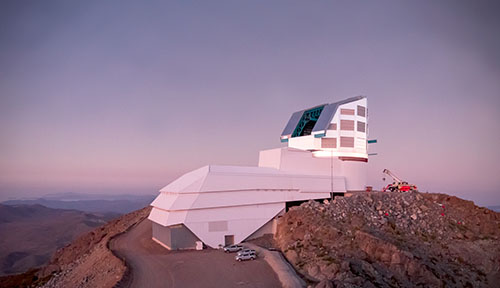DGSCS 2024 | July 8 - 11, 2024 | Chicago, IL
Vera C. Rubin Observatory
Credit: Y. AlSayyad/Rubin Obs/NSF/AURA
Over the last two decades, large photometric surveys like SDSS, Pan-STARRS, and DES have discovered dozens of resolved stellar systems around the Milky Way with extremely low stellar masses. These dwarf galaxies and star clusters have turned out to be excellent cosmological probes: they reach the smallest accessible scales of the power spectrum, trace hierarchical structure formation, and provide archaeological windows to the first stars and galaxies. In the past 5 years, all-sky astrometry from Gaia has further complemented these photometric surveys, enabling the discovery and characterization of these systems as they tidally disrupt into stellar streams. The next major advance in the field is Rubin/LSST. In just one year, LSST could double the number of dwarf galaxies and star clusters around the Milky Way, and it lays the groundwork to discover similarly low-mass systems beyond the Milky Way.Credit: Y. AlSayyad/Rubin Obs/NSF/AURA
This workshop aims to convene a small group of researchers interested in dwarf galaxies, star clusters, and streams. Science topics will include observational frontiers/challenges in imaging and spectroscopy, dwarf galaxies beyond the local group, dwarf galaxy formation, the edge of galaxy formation and star clusters, dark matter in dwarf galaxies, tidal disruption, and near field-far field connections. The goal is to summarize the current state of the field and identify open questions and directions to pursue as LSST begins operations. The fourth day of the workshop will also include a tutorial on LSST tools. We are aiming for a very interactive workshop, with about half of the time for coffee breaks, poster time, and discussions. To facilitate this, we expect the majority of contributions to be posters, and the workshop will be limited to 100 participants.
Invited Speakers
| Ana Bonaca Carnegie Observatories | Mike Boylan-Kolchin University of Texas Austin | Jeff Carlin AURA/Rubin Observatory |
| Peter Ferguson University of Wisconsin - Madison | Jenny Greene Princeton University | Thales Gutcke IfA, Hawaii |
| Ting Li University of Toronto | Kristen McQuinn STScI; Rutgers University | Andrew Pace Carnegie Mellon University |
| Josh Simon Carnegie Observatories |
Scientific Organizing Committee
| Anirudh Chiti KICP/University of Chicago | Shany Danieli Princeton University | Alex Drlica-Wagner Fermilab/UChicago |
| Alex Ji University of Chicago | Andrey Kravtsov The University of Chicago | Burcin Mutlu-Pakdil Dartmouth College |
Local Organizing Committee
| Daisy Bissonette University of Chicago | Anirudh Chiti KICP/University of Chicago | Alice Luna University of Chicago |
| Ava Polzin The University of Chicago | Chin Yi Tan University of Chicago | Pierre Thibodeaux University of Chicago |
Workshop Location
William Eckhardt Research Center (ERC)
The Kavli Institute for Cosmological Physics
ERC 161
5640 S Ellis Avenue
University of Chicago
Chicago, IL, 60637
The Kavli Institute for Cosmological Physics
ERC 161
5640 S Ellis Avenue
University of Chicago
Chicago, IL, 60637

